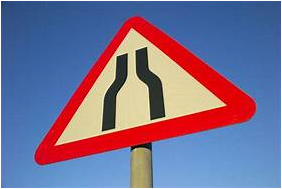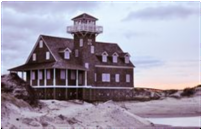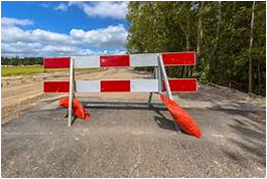 Where Was God?
Where Was God?
Frank Richey
 The news is filled with tragedy and devastation, both natural and man-made. When someone’s life is lost in an accident or illness, often a loving family member will ask, where was God? The implication of this question is that a loving God would not allow this to happen. The question is as old as the first tear, and as recent as the latest newscast. Why does God allow suffering, heartache, disease, and death among His own children?
The news is filled with tragedy and devastation, both natural and man-made. When someone’s life is lost in an accident or illness, often a loving family member will ask, where was God? The implication of this question is that a loving God would not allow this to happen. The question is as old as the first tear, and as recent as the latest newscast. Why does God allow suffering, heartache, disease, and death among His own children?
I recently read W.C. Morro’s book, “Brother McGarvey,” a biography of J. W. McGarvey, a gospel preacher and teacher of the 19th century, who had perhaps the greatest influence on the brethren in his day. On one occasion, brother McGarvey went to the home of a woman whose son had just died. In her grief, she said, “brother McGarvey, where was God when my son died? Without hesitation he answered, “the same place He was when His Son died.” What a beautiful answer. Heartache and death of a loved one should not be blamed on God. It should remind us that the “Creator of the Universe” experienced the same thing, and that He knows how we feel.
Many times I have conducted funeral services. Sometimes I use passages that show that deity can be touched by our suffering. For example, when Jesus approached the city of Nain, he came upon a funeral procession; the only son of a widow had died and was being carried out for burial. On this occasion, Jesus was so touched by this graphic example of human suffering that he approached the funeral procession. The Bible says, “When the Lord saw her, He had compassion on her and said to her, “Do not weep.” Then He came and touched the open coffin, and those who carried him stood still. And He said, “Young man, I say to you, arise.” 15 So he who was dead sat up and began to speak. And He presented him to his mother.”(Luke 7:13-15) Another passage is in Luke 4:18, where Jesus quotes from Isaiah 49:8-9. The passage is a prophecy of Jesus. The Bible says in this passage, “ The Spirit of the LORD [is] upon Me, Because He has anointed Me To preach the gospel to [the] poor; He has sent Me to heal the brokenhearted, To proclaim liberty to [the] captives And recovery of sight to [the] blind, To set at liberty those who are oppressed.”
People handle adversity in different ways. While one may clench his fist and shake his hand at God asking, “Why God?” while another man may raise his open hand to God and simply ask, “Why?” Though these actions are very similar, they are poles apart in attitude. The first man questions and blames God for what has transpired, while the second man simply seeks to know why. When Job experienced the total devastation of wealth and family on the same day, no doubt, the impact of this on Job was no different than the pain and heartache that we would have in a similar situation. But notice how Job reacted: “Then Job arose, tore his robe, and shaved his head; and he fell to the ground and worshiped. And he said: “Naked I came from my mother’s womb, and naked shall I return there. The Lord gave, and the Lord has taken away; blessed be the name of the Lord.” (Job 1:20-21) However, Mrs. Job had a different reaction. She told her husband, “curse God and die.” (Job 2:9). But Job responds to her by saying, “…You speak as one of the foolish women speaks. Shall we indeed accept good from God, and shall we not accept adversity?” In all this Job did not sin with his lips.” (Job 2:10)
A passage that I have taped to my computer monitor (so I can see it every day) is Psalm 119:71, which says, “It is good for me that I have been afflicted, That I may learn Your statutes.” John Gill, in his commentary, says of this passage, “Afflictions are sometimes as a school to the people of God, in which they learn much both of their duty and of their privileges; and when they are teaching and instructive, they are for good.” In times of adversity, death, and heartache, we need to look for the value in the situation rather than seek to blame God.
You Are Not Alone
When we begin to think that our sufferings are so great that we cannot bear them, we need only to turn to God’s Word for encouragement and examples of those, like us, who had seemingly insurmountable problems. Consider these examples:
Joseph– Joseph was hated by his brothers (Genesis 37:5), and they plotted to kill him. They changed their minds and sold him into slavery. (Genesis 37:24-27) After being sold into slavery, he was falsely imprisoned because he refused to commit sin (Genesis 39:19-20). Yet we do not read of Joseph blaming God for his situation. Indeed, as the story unfolds, we find that all of this happened because God planned it. Joseph said to his brothers, “But as for you, you meant evil against me; but God meant it for good, in order to bring it about as it is this day, to save many people alive.” (Genesis 50:20)
Israel– The Israelites were God’s chosen people. He loved them, but they turned their backs on Him. God punished them severely for their unbelief, having them to wander in the wilderness for forty years. Many wanted to return to Egypt. Many thought God wanted them to die in the wilderness. However, God used all of their suffering to prepare them to enter the Promise Land, a land that, at that time, must have been like the Garden of Eden. God describes the land by saying, “For the Lord your God is bringing you into a good land, a land of brooks of water, of fountains and springs, that flow out of valleys and hills;8 a land of wheat and barley, of vines and fig trees and pomegranates, a land of olive oil and honey; a land in which you will eat bread without scarcity, in which you will lack nothing; a land whose stones are iron and out of whose hills you can dig copper.” (Deuteronomy 8:7-9) Yet God still warned them that if they forgot the Lord, and followed other gods, and served them and worshipped them, He said, “I testify against you this day that you shall surely perish.” (Deuteronomy 8:19)
Manasseh– Manasseh was the most wicked king of Judah. As a result, God brought the army of the Assyrians to Jerusalem. Manasseh was captured, hooked in the mouth like a fish, bound, and carried off into captivity. During this affliction, Manasseh “implored the Lord his God, and humbled himself greatly before the God of his fathers, and prayed to Him.” (2 Chronicles 33:12-13). As a result of this, Manasseh was allowed to return to Jerusalem.
Prodigal son- In Luke, chapter fifteen, we read the parable of the prodigal. You remember the story of how a man’s younger son demanded his inheritance, was given it and squandered it. Penniless, after living a life of sin, he returns home to serve his father as a slave. The story tells us that the father saw him when he was still a great way off, had compassion, ran and fell on his neck, and kissed him. If I understand this parable, God is the father, and the younger son represents the Gentiles. Though they were separated from God, God still loved them and wanted them to return home. So it is with us. We like the prodigal, often suffer because of our own mistakes and decisions. However, God is still there. God wants us to return to Him.
Paul– No one can doubt the love and loyalty Paul had to his Savior. Yet, in a time of his deepest sorrow, Paul turns to God and asks Him to remove a “thorn,” a physical problem that Paul was enduring. No doubt, this physical problem was a great hindrance to Paul, which also hindered his preaching the gospel. Paul prayed three times, asking God to remove the thorn, but God would not. Satan had given Paul the “thorn” to cripple the cause of Christ, but God used the “thorn” to Paul’s advantage. Notice Paul’s words: “And He said to me, “My grace is sufficient for you, for My strength is made perfect in weakness.” Therefore most gladly I will rather boast in my infirmities, that the power of Christ may rest upon me. Therefore I take pleasure in infirmities, in reproaches, in needs, in persecutions, in distresses, for Christ’s sake. For when I am weak, then I am strong.” (2 Corinthians 12:9-10)
Paul had to learn the lesson of the thorns, and we need to learn the lesson as well. We need to learn (1) The spiritual is far more important than the physical. (2) God knows how to balance burdens and blessings, suffering and glory. (3) Physical affliction need not be a barrier to effective service to the Lord, and (4) We can always rest in God’s Word.
How Can The Sorrow Benefit Us?
Can we find that God’s people can actually benefit from the difficulties of life? God has a number of benefits for His people, but sometimes we must go through the briars in order to smell the roses. Notice these benefits of the thorns of life:
- God’s power and faithfulness can be exhibited in our lives. In John 9:1-6, we have the story of Jesus healing the man that was born blind. Jesus said he was born blind so that the “Son of God may be glorified through it.”
- In teaching us the will of God. Our afflictions can help us learn God’s statutes. How many people do you know that have turned to God after some great difficulty or after the death of a loved one? “It is good for me that I have been afflicted, That I may learn Your statutes. (Psalm 119:71)
- In turning to God. In leading us to seek God in prayer. This can be seen in the Psalm, which says, “When He slew them, then they sought Him; And they returned and sought earnestly for God.” (Psalm 78:34)
- In testing our sincerity. So many examples could be given of those oppressed turning to God. But to summarize this point, God said, “I will return again to My place Till they acknowledge their offense. Then they will seek My face; In their affliction they will earnestly seek me.” (Hosea 5:15)
- In trying our faith. “But He knows the way that I take, When He has tested me, I shall come forth as gold.” (Job 23:10) “For You, O God, have tested us; You have refined us as silver is refined” (Psalm 66:10)
- In humbling us. “who fed you in the wilderness with manna, which your fathers did not know, that He might humble you and that He might test you, to do you good in the end.” Deuteronomy 8:16
- In exercising our patience. ‘And not only that, but we also glory in tribulations, knowing that tribulation produces perseverance” (Romans 5:3), “knowing that the testing of your faith produces patience.” (James 1:3) “For what credit is it if, when you are beaten for your faults, you take it patiently? But when you do good and suffer, if you take it patiently, this is commendable before God.” (1 Peter 2:20)
- In rendering us fruitful in good works. Jesus prunes us that we might bear more fruit. Pruning can be a painful process. (John 15:2) Also, God chastens us, and we know that chastening is painful. The Hebrew writer says, “Now no chastening seems to be joyful for the present, but painful; nevertheless, afterward it yields the peaceable fruit of righteousness to those who have been trained by it.” (Hebrews 12:11)
- In furthering the gospel. The persecution of the church in Jerusalem resulted in the Christians being scattered, and they went “everywhere preaching the word.” (Acts 8:4) Paul told the Philippians that the things that had happened to him (persecutions and imprisonments) had “actually turned out for the furtherance of the gospel.” (Philippians 1:12)
Conclusion
Where was God when you suffered? The same place He was when His Son suffered. He is on the throne of heaven, waiting for the right time to welcome home the saints of all ages and to take vengeance on those who have hurt them. And we shall overcome and be victorious over all forces and power that Satan has used against us in this great spiritual battle.
__________
Truth Is Narrow
Mike Johnson
 Truth is narrow. This concept is easy to see, and most people understand it. Consider an illustration from science. We know under ordinary conditions, water freezes at 32 degrees at sea level. Suppose a scientist says, “I am very broad in my scientific beliefs. I am not one of you scientific bigots who insist water freezes at just 32 degrees, and all who think differently are wrong. Just so people are sincere; it does not matter what their view is about the point when water freezes.”
Truth is narrow. This concept is easy to see, and most people understand it. Consider an illustration from science. We know under ordinary conditions, water freezes at 32 degrees at sea level. Suppose a scientist says, “I am very broad in my scientific beliefs. I am not one of you scientific bigots who insist water freezes at just 32 degrees, and all who think differently are wrong. Just so people are sincere; it does not matter what their view is about the point when water freezes.”
The above attitude would be considered nonsense in science, with no one taking such a person seriously. Yet, views thought ludicrous in other fields are perfectly acceptable in religion. This is because the attitude exists that truth is relative, and it does not matter what one believes, providing that sincerity exists. People, according to many, can believe what they want to about the Bible without any adverse consequences.
With the Bible, as in other fields, truth is narrow, and we must strictly adhere to its teachings. II John 9 points out that if people do not abide in the doctrine, or teaching, of Christ, they do not have God. Jesus reveals, “. . . Every plant which my heavenly Father hath not planted shall be rooted up” (Mt. 15:13). In this passage, He is discussing the hypocritical Pharisees who also engaged in false teaching. The writer of Hebrews makes it clear that salvation is only for those who obey the Lord (Heb. 5:9). The way to heaven is even described as “narrow” or “restricted,” while the road to hell is called the “broad” way (Mt. 7:13-14).
When it comes to God’s Word, truth is essential. Only “truth” can set us free from sin (Jn. 8:32). It does matter what one believes, teaches, and practices!
__________
The Parable of the Lifesaving Station
 There was once a crude little life-saving station on a dangerous seacoast where shipwrecks often occur. The building was just a hut, and there was only one boat, but the few devoted members kept a constant watch over the sea, and with no thought for themselves, they went out day or night tirelessly searching for the lost.
There was once a crude little life-saving station on a dangerous seacoast where shipwrecks often occur. The building was just a hut, and there was only one boat, but the few devoted members kept a constant watch over the sea, and with no thought for themselves, they went out day or night tirelessly searching for the lost.
Many lives were saved by this wonderful little station so that it became famous. Some of those who were saved and various others in the surrounding areas wanted to become associated with the station and give of their time and money and effort for the support of its work. New boats were bought, and new crews were trained. The little life-saving station grew.
Some of the new members of the life-saving station were unhappy that the building was so crude and poorly equipped. They felt a more comfortable place should be provided as the first refuge for those saved from the sea.
So they replaced the emergency cots with beds and put better furniture in an enlarged building. Now the life-saving station became a popular gathering place for its members, and they redecorated it beautifully and furnished it as a sort of club.
Less of the members were now interested in going to sea on life-saving missions, so they hired lifeboat crews to do this work. The mission of life-saving was still given lip service, but most were too busy or lacked the necessary commitment to take part in the life-saving activities personally.
About this time, a large ship wrecked off the coast, and the hired crews brought in boatloads of cold, wet, and half-drowned people. They were dirty and sick, some spoke a strange language, and the beautiful new club was considerably messed up. So the property committee immediately had a shower house built outside the club where the victims of any shipwrecks could be cleaned up before coming inside the clubhouse.
At the next meeting, there was a split in the club membership. Most of the members wanted to stop the club’s life-saving activities as being unpleasant and a hindrance to the normal pattern of the club. But some members insisted that life-saving was their primary purpose and pointed out that they were still called a life-saving station. But these members were finally voted down and told that if they wanted to save the lives of all the various kinds of people shipwrecked in those waters, they could begin their own life station down the coast. They did.
As the years went by, the new station experienced the same changes that had occurred in the old. They evolved into a club, and yet another life-station was founded. If you visit that seacoast today, you will find a number of exclusive clubs all along that shore. Shipwrecks are still frequent in those waters, but now most of the people drown!
Author Unknown
__________
God’s Barriers on the Road to Hell
Jarrod Jacobs
 Picture a bridge that has just been washed away. When those working on this problem come to the scene, they put up barriers, or barricades to keep people from endangering their lives and the lives of others. Yes, accidents can occur, and yes, people can run over the barriers to their death — but rest assured, they were warned! Barriers such as the ones mentioned may have flashers, flags, and any other attention-getting device that can be attached. This is because they are intended to warn people of danger.
Picture a bridge that has just been washed away. When those working on this problem come to the scene, they put up barriers, or barricades to keep people from endangering their lives and the lives of others. Yes, accidents can occur, and yes, people can run over the barriers to their death — but rest assured, they were warned! Barriers such as the ones mentioned may have flashers, flags, and any other attention-getting device that can be attached. This is because they are intended to warn people of danger.
The ways to Heaven and Hell are pictured as roads, one narrow and one broad (Matt. 7:13-14). Spiritually, God has set up barriers to warn us of the coming destruction on the broad way and lead us to Him. Some may try to run over, go around, or otherwise avoid the barriers, but they are still there. What are some barriers God has set up on the road to Hell?
- THE BIBLE:
This book was given to warn us of the impending doom and destruction of Hell. Looking to the New Testament, we see that Jesus spoke of the dangers and punishment of Hell (Matt. 25:41). In studying what the Bible says about Hell, we find that Jesus talked more about Hell than any other teacher in the New or Old Testaments. The Bible also warns of the type of people that will be in Hell. We see that drunkards, murderers, fornicators, those who are abusive to their spouse or children, etc. will be cast into the Lake of Fire (I Cor. 6:9-10; Gal. 5:19-21; Rev. 21:8).
The Bible is not simply “another” book. This book is filled with God’s own words (II Tim. 3:16-17)! Therefore, when we read in the Bible about Hell being a reality; we need to pay attention! When God takes the time to warn us, we better listen! In reading the Bible, we learn that God wants no one to go to Hell (II Pet. 3:9). This is why He has given us His book that warns us of His wrath and Hell fire! We need to remember that God’s justice will not allow sin to go unpunished. Let us all heed the warnings spelled out in the Bible and live a life that is pleasing to God.
- THE CROSS:
A second barrier on the road to Hell is the cross. Christ endured the cross for the world’s sins (Matt. 20:28; II Cor. 5:20-21). When we think of the cross, we can see: 1. The spotless lamb of sacrifice, Jesus. 2. Man’s sins needing a Savior (Rom. 6:23, 3:10), and Jesus taking those sins upon Himself (Heb. 2:9; Rom. 5:8). 3. How terrible sin is and how it ruins the lives of all mankind (Isa. 59:1-2; Rom. 6:23; Jas. 1:14-15).
By looking to the cross, we see a great, grand barrier that stands in our way as we travel the road to Hell. By the cross, Jesus draws all men to Him (Jn. 12:32-33). At the cross, we see how terrible sin is and the price that had to be paid in order for man to receive the forgiveness of his sins (II Cor. 5:20-21). How much more warning do we need? For the honest soul, this one barrier is enough to motivate him to turn from his wicked way and turn to Christ.
- PREACHING THE TRUTH:
When the truth is preached, there can be no clearer warning to lost souls. If a gospel preacher does His job, he will warn people about the pain, torture, and eternal nature of Hell (Col. 1:28). If he does not do this, the blood of those sinners will be on his hands (Ezek. 3:17-21; Acts 20:20, 27). Many preachers do not want to talk about Hell. Their reason is that they would like to speak solely about “positive” things. (Thus, assuming that the warning and convicting of souls and turning them to Christ is not a positive thing.) This is wrong! Without warnings from God’s word, we will not know what dangers lie ahead (Acts 20:29-31)!
When we see men willing place the barrier of truth before lost souls, we will see men willing to preach about the blood of Christ. Let us never forget this blood. It brings redemption to all mankind (Eph. 1:7; Col. 1:14)! This blood redeems us from the shackles of sin and saves us from Hell (I Pet. 1:18-19).
We also need brave men who are willing to preach about God’s grace. Without God’s grace set as a barrier before lost souls, we are without hope. It is God’s grace (unmerited favor) that has provided salvation from sins (Rom. 5:8). The truth must be preached over and over as warning to those who have not obeyed God and to those who have fallen away (II Tim. 4:2-5). Paul said, “Knowing therefore the terror of the Lord, we persuade men” (II Cor. 5:11). Thank God for those who are willing to stand up and proclaim the Truth, regardless of the consequences! This barrier will go far in preventing lost souls from entering into Hell.
- THE CHRISTIAN’S INFLUENCE:
Some may not listen Some may not listen to the Bible, or listen to gospel preaching, but people cannot ignore our good influence! Peter points out that a godly wife can convert her unbelieving husband “by the conversation” (i.e., through her good example, I Pet. 3:1-6). Jesus said, “Ye are the salt of the earth: but if the salt have lost his savour, wherewith shall it be salted? it is thenceforth good for nothing, but to be cast out, and to be trodden under foot of men. Ye are the light of the world. A city that is set on an hill cannot be hid. Neither do men light a candle, and put it under a bushel, but on a candlestick; and it giveth light unto all that are in the house. Let your light so shine before men, that they may see your good works, and glorify your Father which is in heaven” (Matt. 5:13-16).
When we cease being the salt and light of the world; and cease being that good example for others to follow, we are headed toward Hell! (If we do not move forward, we are moving back. There is no in-between!) Our lives must be such that we warn others about the dangers of Hell. Remember, we are commanded to let our light shine before men! The reason being, “that they may see your good works, and glorify your Father which is in heaven” (Matt. 5:16). If our influence is responsible for keeping only one soul from enduring the pain and agony of Hell, it will be worth it! Are we being the barriers we ought to be?
- JESUS CHRIST:
Without question, the greatest barrier that is placed on the road to Hell is Jesus Christ. He came to this world to open up Heaven to men and to block the road to Hell. He came to seek and save that which was lost (Lk. 19:10). He came to die for mankind’s sin (Jn. 18:36). Paul said, “Christ Jesus came into the world to save sinners; of whom I am chief” (I Tim. 1:15). While upon this earth, Jesus said that He was the door to the Father, and “the way, the truth, and the life: no man cometh unto the Father, but by me” (Jn. 10:9-11, 14:6). He promised to prepare a place for those who were faithful to Him, and promised to come back to get them and take them to Heaven (Jn. 14:1-3). Remember, Matthew 20:28 says that Jesus died as “a ransom for many”!!
CONCLUSION
How many people would intentionally run through warnings and barriers and drive to a sure and sudden death? Not many, that is certain. Yet, many people are doing it spiritually! They ignore Jesus and His barriers that line the broad way that leads to destruction (Matt. 7:14). Jesus stands with flashers, flags, and everything else in His word to get our attention, and we blindly go past the warnings meant for us. It is a sad but true fact that many will be cast into Hell on that Day of Judgment. Remember, those people who are cast into Hell will go by their own choice, and not because God hasn’t warned them! Jesus said, “Come unto me, all ye that labour and are heavy laden, and I will give you rest. Take my yoke upon you, and learn of me; for I am meek and lowly in heart: and ye shall find rest unto your souls. For my yoke is easy, and my burden is light” (Matt. 11:28-30). As long as time stands, this invitation is extended to all who will respond to the gospel call (II Thess. 2:14). Have you made your life right with God? Do not let another opportunity pass without thinking seriously and responding to the gospel. God’s barriers are numerous, but they will not force you to enter into that path that leads to eternal life. You must come to Him willingly.
__________
T.N.T.
 A preacher once sent a number of books from his personal library (among them a copy of the New Testament) to be rebound. On the return of his books, he was startled to discover on the spine of the New Testament–in gold embossed letters–the initials “T.N.T.” You see, there was no room to spell out “The New Testament,” so the bookbinder merely inscribed the first letter of each of those three words.
A preacher once sent a number of books from his personal library (among them a copy of the New Testament) to be rebound. On the return of his books, he was startled to discover on the spine of the New Testament–in gold embossed letters–the initials “T.N.T.” You see, there was no room to spell out “The New Testament,” so the bookbinder merely inscribed the first letter of each of those three words.
Not a bad name for the New Testament, is it? The bookbinder’s abbreviation was right on target. Truly, the New Testament is “God’s T.N.T.” — spiritual dynamite! Paul said, “For I am not ashamed of the gospel, for it is the “power” of God for salvation…” (Romans 1:16)
====================================================
Editor: Mike Johnson
www.seekingthingsabove.org

